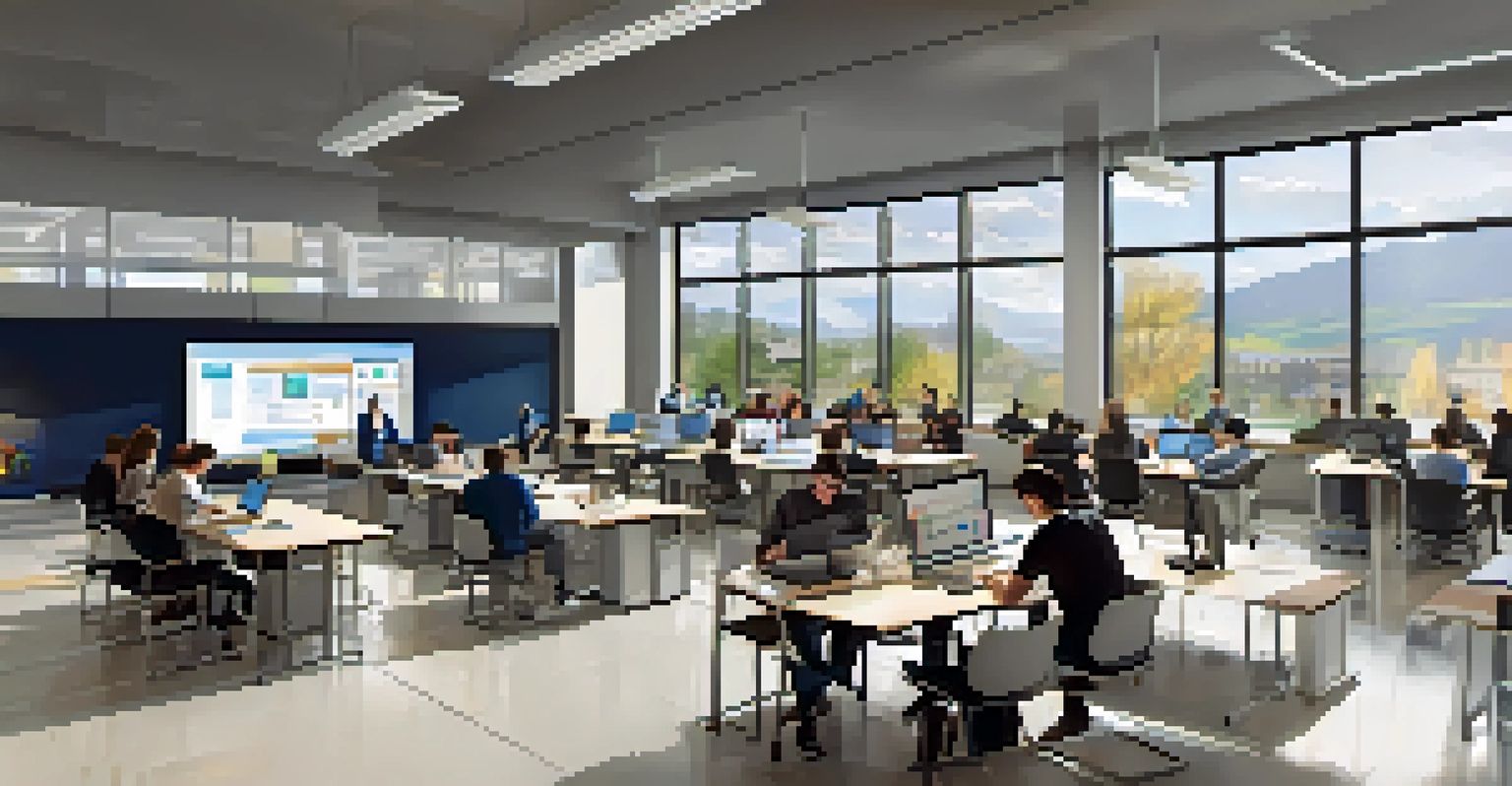Workforce Development Programs in Spokane's Educational Institutions

Introduction to Workforce Development in Spokane
Workforce development programs are essential for preparing individuals for the job market. In Spokane, educational institutions play a pivotal role in equipping students with the skills needed to thrive in various industries. These programs not only focus on academic learning but also emphasize practical experience and professional growth.
The future belongs to those who believe in the beauty of their dreams.
By collaborating with local businesses and community organizations, Spokane's institutions ensure that their curriculum aligns with the evolving needs of the workforce. This connection helps students gain relevant skills and increases their employability upon graduation. It's a win-win situation for both students and employers.
As we dive deeper into this topic, we will explore specific programs offered by Spokane's educational institutions and their impact on the local economy and community.
Community Colleges: A Hub for Skill Development
Spokane's community colleges, such as Spokane Community College and Spokane Falls Community College, offer a wide range of workforce development programs. These institutions provide hands-on training in fields like healthcare, technology, and trades, ensuring that students are job-ready upon completion. The focus on practical skills is crucial in today’s job market, where employers seek candidates who can hit the ground running.

Many of these programs are designed in partnership with local businesses, allowing students to gain real-world experience through internships and apprenticeships. This collaboration not only enriches the learning experience but also creates a direct pathway to employment for graduates. For example, students in the nursing program often complete their clinical hours at nearby hospitals, gaining invaluable experience.
Spokane's Community Colleges Thrive
Community colleges in Spokane offer hands-on training in various fields, ensuring students are job-ready through partnerships with local businesses.
Moreover, community colleges often provide flexible scheduling options, making it easier for working adults to pursue further education. This accessibility is vital for individuals looking to upskill or change careers mid-life.
University Programs Focused on Workforce Readiness
In addition to community colleges, local universities like Gonzaga University and Eastern Washington University offer specialized workforce development programs. These programs often focus on leadership, business management, and advanced technology skills, preparing students for higher-level positions in their fields. A strong emphasis is placed on critical thinking and problem-solving, which are highly valued by employers.
Education is the most powerful weapon which you can use to change the world.
Through initiatives like internships, co-op programs, and mentorship opportunities, universities provide students with real-world insights and connections in their industries. For instance, Gonzaga's business program has strong ties with local companies, facilitating networking opportunities that can lead to job offers upon graduation.
Furthermore, universities are increasingly integrating experiential learning into their curricula, allowing students to apply theoretical knowledge in practical settings. This approach not only enhances learning but also boosts student confidence as they prepare to enter the workforce.
High School Programs: Early Career Preparation
Spokane's high schools are also stepping up to the plate with workforce development initiatives. Programs such as Career and Technical Education (CTE) offer students the chance to explore various career paths while still in school. This early exposure can significantly influence students' future career decisions and academic pursuits.
Through hands-on classes in fields like automotive technology, culinary arts, and computer science, students gain valuable skills that can lead to immediate employment or further education. Schools often collaborate with local businesses to provide job shadowing and internship opportunities, giving students a taste of what to expect in the workforce.
Universities Enhance Workforce Skills
Local universities focus on leadership and advanced skills, providing students with real-world experiences and networking opportunities to boost employability.
By integrating these programs into the high school curriculum, educators aim to cultivate a workforce that is not only skilled but also adaptable to the changing job landscape. This proactive approach helps students transition smoothly from high school to their next steps, whether that’s entering the workforce or pursuing further education.
Benefits of Workforce Development Programs
The benefits of workforce development programs in Spokane are far-reaching. For students, these programs provide the necessary skills and experience to enhance their employability. As they navigate their educational journey, they gain confidence and clarity about their career aspirations, making informed choices about their futures.
For local businesses, these programs create a skilled talent pool tailored to their specific needs. By working closely with educational institutions, employers can help shape the curriculum to ensure graduates possess the skills required in their industries. This collaboration fosters a stronger local economy, as businesses can hire qualified candidates from the community.
Additionally, workforce development initiatives contribute to the overall growth and prosperity of Spokane. By investing in education and skills training, the community can address workforce shortages and build a more resilient economy that benefits everyone.
Challenges Facing Workforce Development Programs
Despite their many benefits, workforce development programs in Spokane face several challenges. One of the primary issues is funding; many programs rely on grants and donations, which can fluctuate year to year. This uncertainty can impact the quality and availability of training opportunities for students.
Another challenge is keeping pace with technological advancements and changing job market demands. As industries evolve, educational institutions must continuously update their programs and curriculum to ensure relevance. This requires a proactive approach to curriculum development and strong partnerships with local employers to anticipate future needs.
High Schools Prepare Future Workers
High school programs like Career and Technical Education (CTE) expose students to career options early, helping them transition smoothly into the workforce or further education.
Finally, outreach and awareness are crucial in ensuring that students know about the available programs. Many individuals may not be aware of the opportunities that exist within their community, which can hinder participation. Increasing awareness through marketing and community engagement efforts is necessary to attract a diverse range of students.
The Future of Workforce Development in Spokane
Looking ahead, the future of workforce development programs in Spokane appears promising. As the demand for skilled workers continues to rise, educational institutions are likely to expand and adapt their offerings to meet this need. This evolution will involve more collaboration with local industries and an emphasis on innovative training methods.
Emerging technologies, such as online learning platforms and virtual reality simulations, could play a significant role in shaping these programs. By leveraging these tools, educational institutions can provide flexible, accessible training that caters to a wider audience, including those juggling work and family responsibilities.

Ultimately, the continued success of workforce development programs in Spokane will depend on the collective efforts of educators, employers, and the community. By working together to address challenges and seize opportunities, Spokane can cultivate a workforce that is not only skilled but also prepared to thrive in an ever-changing job market.